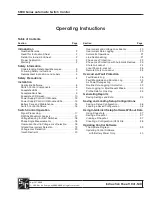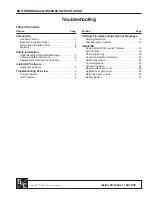
Touchscreen remote control
TSU7000/37
Technical specifications
Product highlights
Date of issue 2005-08-25
Version: 1.0
12 NC: 3104 207 14301
UPC: 3 78499 42727
Specifications are subject to change without notice.
Trademarks are the property of Koninklijke Philips
Electronics N.V. or their respective owners.
© 2005 Koninklijke Philips Electronics N.V.
All Rights reserved.
www.philips.com
Picture/Display
• Backlight
•
Backlight color:
Blue
•
Diagonal screen size (inch):
3.8 inch
•
Display colors:
65,536
•
Resolution:
320 x 240 pixels
• Touch panel
Connectivity
•
USB:
USB 1.1
Convenience
• Automatic power off
• Clock with calendar
• Cradle/ docking station
• Cursor key
• Gentle fade out of light
• Hard buttons
•
Multi language:
GB, D, F, E, NL
• Pick up sensor
•
Programmable timers:
20
Accessories
•
Batteries:
Ni-MH battery pack
• Docking Station
• Printed User Guide
• USB cable
• User Guide on CD-ROM
• Warranty Card
System Requirements
• CD-ROM drive
•
Hard disk space:
75 MB
•
PC OS:
Windows 98 SE, 2000, ME, XP
•
RAM memory:
64 MB
•
USB:
Free USB port
Dimensions
•
Master carton quantity:
1
•
Product dimension (WxDxH) inch:
3.6" x 1.1" x
6.0"
•
Product weight in lbs:
0.551
•
Temperature Range (Operation):
+41 degree F
to +113 degree F
Power
•
Charging time:
Max 3 hrs hr
•
Mains power:
120V (+/-10/-15%)/60Hz
Customisation
•
Editor application on PC:
ProntoProEdit NG
• On screen customisation
• Full screen configurability
• Transparency
• Alpha-blending
•
Macros:
Up to 250 steps
System Specifications
•
CPU:
Mitsubishi 32 bit
•
CPU speed:
20 Mhz
•
Flash memory size:
32 MB
Infrared Capabilities
•
Operating distance:
33 ft (10 m)
• Learning IR codes
•
Learning frequency range:
Up to 78 kHz and 455
kHz
•
Transmitting LEDs:
4
• Universal IR code database
•
Number of brands in database:
Over 1100
RF Capabilities
•
Adresses (ID's):
16
•
Channels:
4
•
Communication:
1-way
•
Frequency (MHz):
418
Universal IR code database
A universal IR code database refers to a library of
infrared codes built-in to a particular remote. This
feature allows a remote to control your equipment
without needing to learn individual signals. Select the
correct infrared code sets in the database for the
devices you want to control, to enable control of virtually
every audio/video system element on the market today
– regardless of model or brand.
Learning functionality
Learning functionality refers to the process through
which a remote control captures and stores infrared
signals from other remotes for later use. When device
codes are not included in the on-board database, they
can always be learned from the original remote, simply
by pointing to it.
One-touch convenience
One-touch convenience allows you to perform multiple
commands with one press of a button via a macro. A
macro combines a string of pre-programmed
commands under one single button. Therefore, it simply
takes one button press to execute a series of functions.
Alpha blending
Alpha blending is used to create the effect of
transparency. It does this by combining a translucent
foreground with a background colour to create an in-
between blend.
Radio frequency
A radio technology that allows you to control
components not in direct line-of-sight, such as through
walls or other obstacles. There are two types of RF used
in remote controls: RF to component, and RF to infrared.
Future proof
To keep your device up to date and enhance its
functionality you can download new softwares that
become available. Connect the device to the Internet,
either directly or through a PC, and launch the upgrade
utility.
Backlighting
Backlighting is a feature that illuminates the LCD screen
or keypad for use in the dark. The two most common
types of backlighting include LED and
electroluminescent (EL). Remotes backlit with LEDs are
typically bright but uneven with a yellow or green color,
while EL panels are smooth with blue, white or green
shades.
Pick-up sensor
Pick-up sensor is a feature that automatically activates
the backlighting when the remote is moved or picked
up.
Timer functionality
Timer functionality refers to a feature that allows a
remote control to perform certain actions automatically
at a predefined time.
Transparency




















